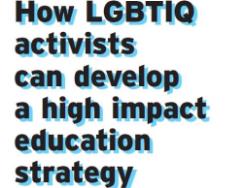GALE publishes strategic guide for NGOs

17 May 2017 - To celebrate IDAHO, GALE today published the new strategic guide for NGOs on how to engage with education and education systems. The key message of the guide is to create a cooperation between NGOs, the government and the education field itself. Because countries are in very different situations, the guide offers a rough situation analysis and broad suggestions for denying, ambiguous and supportive contexts.
Core message: cooperation
The core message of the guide is to focus on cooperation between NGOs, the government and the education field itself. A lot of current LGBTI educational projects and products are made only by LGBTI NGOs themselves. These interventions often have little dissemination because of lack of money and access to schools. They may also be of limited quality. This depends on how expert the LGBTI developers are. They may be very expert in their own LGBT or I concerns. But often they are less focused on what skills young people need to learn and on how to integrate these in sustainable school programs.
GALE advises to create a strategic “GALE” committee to get different types of expertise and power together. The LGBTI movement needs educational expertise to raise the quality of programs and campaigns. It also need the power of key educational institutions and education authorities to get a good dissemination and integration in school curricula and policies.
Denying, ambiguous and supportive contexts
GALE made a distinction between denying, ambiguous and supportive contexts. In denying contexts, NGOs are often isolated and cannot get access to schools. For this situation, GALE advises to focus on storytelling. This connects to the strength of the NGOs and offers opportunities to engage more intensively with their own grass roots constituency, but also use the stories as a first form of human rights violations documentation and informal education.
In ambiguous contexts, NGOs are often developing own interventions like more formally organized campaigns, peer education and youth action. GALE warns this logical step may create a “non-cooperation trap” where protecting and sustaining their own services start to block opportunities for mainstreaming (integration of attention for sexual diversity in regular educational routines. GALE advises how to adapt own services so they allow for or even stimulate mainstreaming.
In supportive countries, the government takes the initiative. This may not be easy for LGBTI NGOs wo are used to being activists and in the lead. They now need to take a step back to allow the government and the education sector to take “ownership” and leadership. GALE advises how LGBTI NGOs can take such a ore consultative position and adapt their services to this.
Source: How LGBTIQ Activists Can Develop a High Impact Education Strategy: The GALE Committee Guide.


